
Ron DeSantis news – live: DeSantis sued over ‘voter suppression’ measures as Trump takes lead in new poll
Ron DeSantis is facing three new lawsuits after he signed a new law just hours before announcing his presidential campaign – legislation which makes it harder to vote in Florida. The bill allows Mr DeSantis to continue as governor in the Sunshine State as he campaigns for the White House, but it also restricts the use of mail-in ballots, attempts to make it easier to purge voting rolls, and places limits on third-party voter registration organisations, according to Mother Jones. Meanwhile, Donald Trump is leading Mr DeSantis among Republicans in California, according to a new poll. The former president has the support of 44 per cent of Republicans in the state, while Mr DeSantis has 26 per cent, according to a poll by the UC Berkeley Institute of Governmental Studies. Three months ago, Mr DeSantis led Mr Trump among likely GOP primary voters in the state by eight percentage points. Poll director Mark DiCamillo told the Los Angeles Times: “Trump dominates the news, and I think he enjoys that, and I think he gets the sense when he is dominating the news, he’s probably expanding his messaging to his base.” Read More Donald Trump Jr shares doctored Office clip showing Ron DeSantis wearing a woman’s suit DeSantis accuses Trump of ‘moving to the left’ as he tells ex-president: ‘You’ve changed’ Trump's welcome of Scott into 2024 race shows his calculus: The more GOP rivals, the better for him Disney opposes DeSantis request to disqualify judge in free speech lawsuit
2023-05-29 14:48

Turkey's Erdogan turns away reform-minded challenger to win another term
Turkish President Recep Tayyip Erdogan turned away a challenger who sought to reverse his authoritarian-leaning changes, securing five more years to oversee the country at the crossroads of Europe and Asia that plays a key role in NATO. Erdogan prevailed by winning more than 52% of the vote in Sunday's presidential runoff, which came two weeks after he fell short of scoring an outright victory in the first round. A majority of Turkish voters in the second round chose him over challenger Kemal Kilicdaroglu, showing their support for a man who they see as a strong, proven leader. Voters were divided between loyalty to Erdogan, who has ruled for two decades, and hopes for the opposition candidate, who promised to return to democratic norms, adopt more conventional economic policies and improve ties with the West. With his immediate political future secure, Erdogan must now confront skyrocketing inflation that has fueled a cost-of-living crisis and rebuild in the aftermath of a devastating earthquake that killed more than 50,000 people. In two speeches — one in Istanbul and one in Ankara — Erdogan thanked the nation for entrusting him with the presidency again. “We hope to be worthy of your trust, as we have been for 21 years,” he told supporters on a campaign bus outside his home in Istanbul. He said the divisions of the election are over, but he continued to rail against his opponent. “The only winner today is Turkey,” Erdogan said outside the presidential palace in Ankara, promising to work hard for Turkey’s second century, which he called the “Turkish century.” The country marks its centennial this year. Supreme challenges lie ahead, starting with the economy that has taken a beating from what critics view as Erdogan’s unorthodox policies. He also must tend to massive rebuilding efforts in 11 provinces hit by the Feb. 6 earthquake that leveled entire cities. Kilicdaroglu said the election was “the most unjust ever,” with all state resources mobilized for Erdogan. “We will continue to be at the forefront of this struggle until real democracy comes to our country,” he said in Ankara. He thanked the more than 25 million people who voted for him and asked them to “remain upright.” The people have shown their will "to change an authoritarian government despite all the pressures,” Kilicdaroglu said. Supporters of Erdogan, a divisive populist and masterful orator, took to the streets to celebrate, waving Turkish or ruling party flags, honking car horns and chanting his name. Celebratory gunfire was heard in several Istanbul neighborhoods. His next term is certain to include more delicate maneuvering with fellow NATO members over the future of the alliance and the war in Ukraine. Leaders across the world sent their congratulations, highlighting Turkey and Erdogan’s enlarged role in global politics. Western politicians said they are ready to continue working with Erdogan despite years of sometimes tense relations. Most imminently, Turkey holds the cards for Sweden’s hopes to join NATO. The bid aims to strengthen the military alliance against Russia and is central to the continuity of a deal to allow Ukrainian grain shipments and avert a global food crisis. “No one can look down on our nation,” Erdogan said in Istanbul. Steven A. Cook, a senior fellow at the Washington-based Council on Foreign Relations, said Turkey was likely to “move the goal post” on Sweden’s membership in NATO as it seeks demands from the United States. He also said Erdogan, who has spoken about introducing a new constitution, was likely to make an even greater push to lock in changes adopted by his conservative and religious Justice and Development Party, or AKP. In his victory remarks, Erdogan said rebuilding the quake-struck cities would be his priority. He also said a million Syrian refugees would go back to Turkish-controlled “safe zones” in Syria as part of a resettlement project being run with Qatar. Erdogan has retained the backing of conservative voters who remain devoted to him for lifting Islam’s profile in Turkey, which was founded on secular principles, and raising the country’s influence in international politics. Erdogan’s rival was a soft-mannered former civil servant who has led the pro-secular Republican People’s Party, or CHP, since 2010. The opposition took months to unite behind Kilicdaroglu. He and his party have not won any elections in which Erdogan ran. In a frantic outreach effort to nationalist voters in the runoff, Kilicdaroglu vowed to send back refugees and ruled out peace negotiations with Kurdish militants if he was elected. Erdogan and pro-government media portrayed Kilicdaroglu, who received the backing of the country’s pro-Kurdish party, as colluding with “terrorists” and supporting what they described as “deviant” LGBTQ rights. In his victory speech, Erdogan repeated those themes, saying LGBTQ people cannot “infiltrate” his ruling party or its nationalist allies. In Ankara, Erdogan voter Hacer Yalcin said Turkey’s future was bright. “Of course Erdogan is the winner ... Who else? He has made everything for us," Yalcin said. “God blesses us!” Erdogan, a 69-year-old Muslim, is set to remain in power until 2028. He transformed the presidency from a largely ceremonial role to a powerful office through a narrowly won 2017 referendum that scrapped Turkey’s parliamentary system of governance. He was the first directly elected president in 2014 and won the 2018 election that ushered in the executive presidency. The first half of Erdogan’s tenure included reforms allowing the country to begin talks to join the European Union, as well as economic growth that lifted many out of poverty. But he later moved to suppress freedoms and the media and concentrated more power in his own hands, especially after a failed coup attempt that Turkey says was orchestrated by the U.S.-based Islamic cleric Fethullah Gulen. The cleric denies involvement. In the Kurdish-majority city of Diyarbakir, 37-year-old metalworker Ahmet Koyun said: “It is sad on behalf of our people that a government with such corruption, such stains, has come into power again. Mr. Kemal would have been great for our country, at least for a change of scene." But he said everyone must accept the results. ___ Bilginsoy reported from Istanbul. Bela Szandelszky in Ankara, Turkey; Mucahit Ceylan in Diyarbakir, Turkey; and Cinar Kiper in Bodrum, Turkey, contributed to this report. Read More Ukraine war’s heaviest fight rages in east - follow live Charity boss speaks out over ‘traumatic’ encounter with royal aide Analysis: Only Erdogan knows his plans for Turkey’s future. That is the problem AP News Digest 8:40 a.m. Erdogan declared winner of Turkey presidential run-off – extending his 20-year rule
2023-05-29 12:58
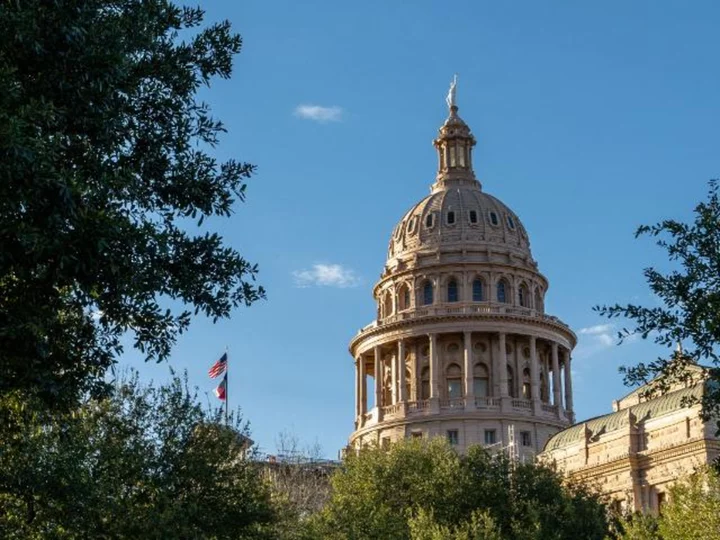
Texas Republicans pass bills targeting elections administration in Houston-area county
Texas Republicans have approved a pair of bills targeting the elections process in Harris County, the state's largest and home to Houston, with voting rights activists accusing the GOP of plotting a "power grab" in an increasingly Democratic county.
2023-05-29 09:26

What’s in the cliffhanger deal struck by Biden and McCarthy to raise the debt limit?
Weeks of sniping back-and-forth between the White House and the Republican majority in the House of Representatives has finally yielded a deal: America will not default on its debt obligations, should Congress act and pass the legislation before Thursday. On Saturday, House Speaker Kevin McCarthy and Joe Biden announced the end of negotiations and the agreement upon a deal late into the evening, with the text of the legislation itself soon to follow. The new compromise both touches on Republican priorities while also safeguarding Joe Biden’s legislative accomplishments. But it comes after weeks of bitter fighting. Republicans accused the White House and congressional Democrats of out-of-control spending, ignoring their rivals’s derisive reminders about the debt incurred by a GOP-led tax cut passed in 2017 that largely benefited wealthier Americans. Democrats, meanwhile, blamed Republicans for holding the country’s credit rating and ability to pay its loans hostage, and for seeking cuts to social welfare programs like food assistance for needy families. As we inch closer to Thursday’s deadline, let’s take a look at what leaders in Washington have come up with to break the deadlock. No more debt drama (for now) The first and most significant achievement of this deal: it raises the debt ceiling through the end of 2024. That guarantees the GOP won’t be able to wage a fight over the issue again, particularly as the presidential campaign season heats up later this year and into the next. Any debt ceiling battle during campaign season, particularly in the summer or fall of 2024, would take Joe Biden off the campaign trail and put his focus firmly on Washington at a time when either of his likely general election opponents, Donald Trump and Ron DeSantis, would be free to continue their politicking. In total, the deal calls for raising America’s debt limit by $4 trillion. Signing away that leverage for the next year is already proving to be one of the toughest pills for congressional conservatives in both the House and Senate to swallow, especially given the lack of other major concessions in the pending legislation. Spending caps The GOP’s big win in the negotiating process, this legislation is set to freeze federal spending at the current level, with the exception of military funding, through 2024. And growth of that spending will be capped at 1 per cent if Congress cannot agree upon a stopgap spending deal in January of 2025. This is a significant restriction for the federal government over the next year, and notably puts in place much stricter spending limits than members of Congress agreed to during the last debt limit fight in 2019. The language allowing for defence spending to increase while domestic programmes face a spending freeze is already irking progressives, who have long argued that the US military’s bloated budget should be at the top of the list for reforms. Caps set by this compromise are simultaneously the biggest victory for Republicans as well as their failure; while the spending caps are certainly more than what Democrats were demanding, they also eliminate the possibility of Republicans using the debt ceiling to make real cuts to programmes already implemented by the Biden administration as part of the Inflation Reduction Act and other legislation. That means that Mr Biden’s 2021-2022 legislative agenda will remain largely intact, despite demands by conservatives to roll back huge parts of it, like efforts to forgive student loans or expand green energy production. Work requirements for food stamps One of the GOP’s efforts to stem the tide of federal spending is centred around the issue of providing food assistance to low-income families. The new legislation is set to expand work requirements for the SNAP programme from the current age cap of 49 to a new cap of 54, meaning that Americans within that age bracket will have to prove employment to receive benefits. The issue may seem oddly specific for Republicans to hold up America’s ability to pay its debts upon, but tightening the restrictions fo federal assistance has long been a target of the GOP, and originally the party wanted to expand those work requirements to Medicaid as well. The new work requirements will sunset in 2030, unless extended before then by a GOP Congress. IRS funding halted The other specific ask that Republicans managed to secure in their compromise with the White House was a halt, at least in part, to a plan to fund new hiring initiatives at the Internal Revenue Service (IRS), America’s tax collection agency. The beleaguered agency was set to receive more funding for agents that the federal government said were to assist taxpayers with filing issues and shore up the IRS’s capabilities; Republicans painted the issue instead as an effort to hire an army of IRS auditors to go after taxpayers for suspected fraud, a non-starter for the party that has long sought, particularly among its conservative wing, to diminish the power and capabilities of both the IRS and other federal agencies. But some conservatives are already complaining that the cuts aren’t enough. Congressman Chip Roy exclaimed angrily after the deal was announced that “98%” of the funding for the expansion of the IRS’s services would still go through. Covid aid The deal has one more minor win for Republicans — a provision to return Covid aid funding that has yet to be appropriated. Millions of dollars in this aid still remains unspent by the federal government, though Democrats have used it thus far to fund a number of federal health programmes which they warn could face cuts if the aid is rolled back entirely. Read More Debt ceiling agreement gets thumbs up from biz groups, jeers from some on political right President attends 2nd grandchild's graduation as daughter of Biden's late son leaves high school Democrats look set to back debt limit deal – while right-wing threatens to blow it up AP News Digest 8:40 a.m. Debt-ceiling deal: What's in and what's out of the agreement to avert US default Asylum-seekers say joy over end of Title 42 turns to anguish induced by new US rules
2023-05-29 05:48
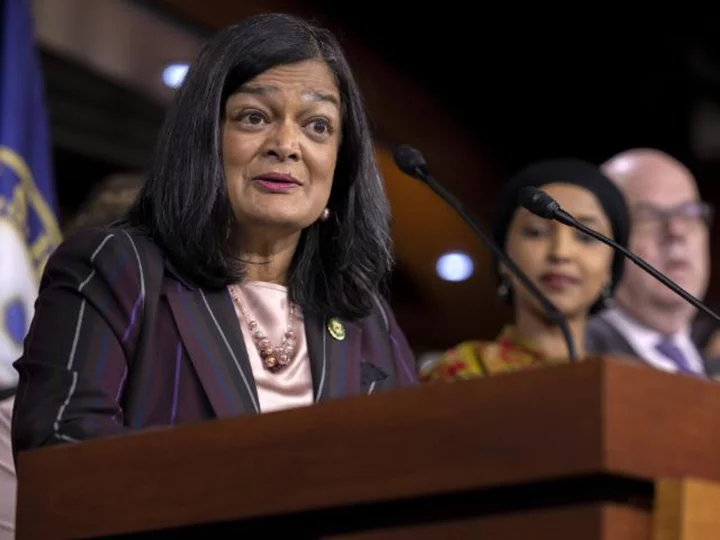
Top House progressive says Democratic leaders should be concerned about debt deal support
Washington Rep. Pramila Jayapal, the chair of the Congressional Progressive Caucus, said Sunday that White House negotiators and Democratic leaders should be concerned about progressive support for the tentative deal to raise the debt ceiling for two years
2023-05-29 02:29
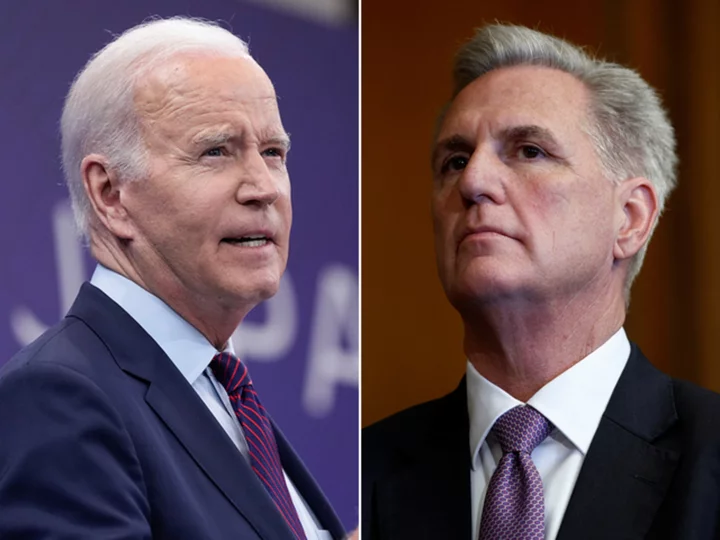
Biden and McCarthy race to sell their debt ceiling deal to lawmakers before the government runs out of money
The White House and Republican leaders in Congress were mounting an intensive push Sunday to consolidate support around an tentative agreement to raise the nation's borrowing limit, their urgent task made complicated by members of both parties voicing concerns over different provisions.
2023-05-29 01:24
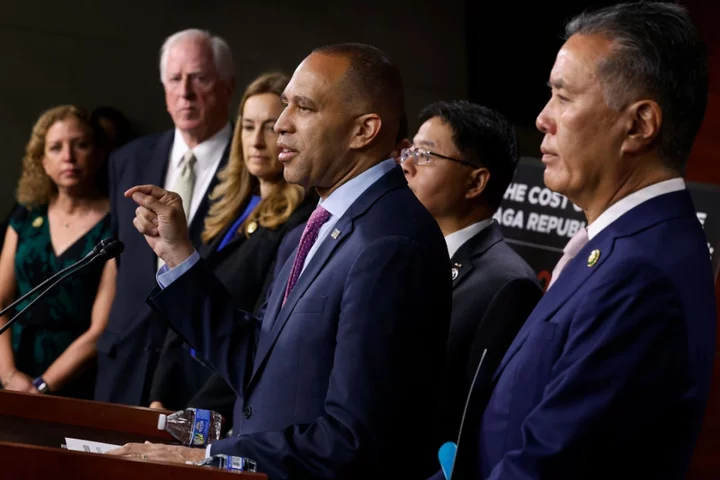
Democrats look set to back 11th hour debt ceiling deal – while GOP right-wingers threaten to blow it up
House Speaker Hakeem Jeffries sounded confident that Congress would vote to avert a default on the US’s obligations on Sunday, hours after news broke that the White House had reached a deal with Republican leadership to raise the debt ceiling. The “agreement in principle” was announced Saturday evening after much of the House of Representatives and Senate had left for the Memorial Day weekend. A handful remained in Washington to continue negotiations ahead of the deadline; the US Treasure Department estimates that the federal government’s ability to pay its debts will be in question come 1 June — this Thursday. Mr Jeffries spoke on CBS’s Face the Nation on Sunday. While he cautioned that he had not seen the actual text of the bill, which is reportedly set to cap funding for the US government (except for the military) through 2024, he offered a simple “yes” when asked directly if he could guarantee that the US would avert default. It’s a statement that will likely mean a sigh of relief for those Americans worried about the effects that a credit downgrade would have on the US economy, though that remains a possibility thanks to the toxic partisanship that brought the US to this point in the first place, but also one that may frustrate progressives and other Democrats who may see the development as Democrats giving in to the GOP’s demands. The deal does stave off further debt ceiling negotiations until 2025, but many on the left simply wish to do away with the limit altogether. And there’s already signs that many on the conservative right do not like the deal, with some even calling any legislation that raises the debt limit a non-starter. Their opposition within the GOP’s slim House majority necessitates votes from Democrats to pass this deal or any other. More follows...
2023-05-28 23:56
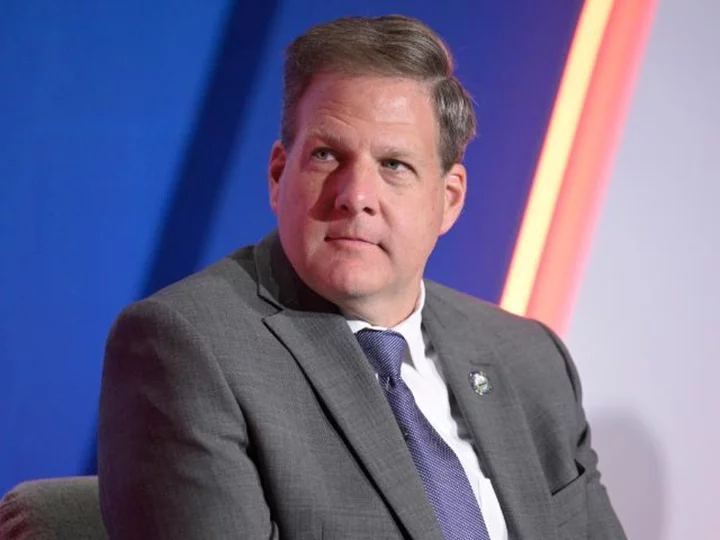
Chris Sununu will decide on 2024 presidential bid 'in the next week or two'
New Hampshire Gov. Chris Sununu will decide "in the next week or two" if he wants to mount a bid for the 2024 Republican presidential nomination.
2023-05-28 22:55

Ron DeSantis has a 'lovability' problem
Ron DeSantis has some catching up to do. The Florida governor entered the 2024 presidential race last week with polls showing him down about 30 points on average to Donald Trump in the GOP primary. DeSantis had trailed by closer to 10 points at the end of last year.
2023-05-28 21:59
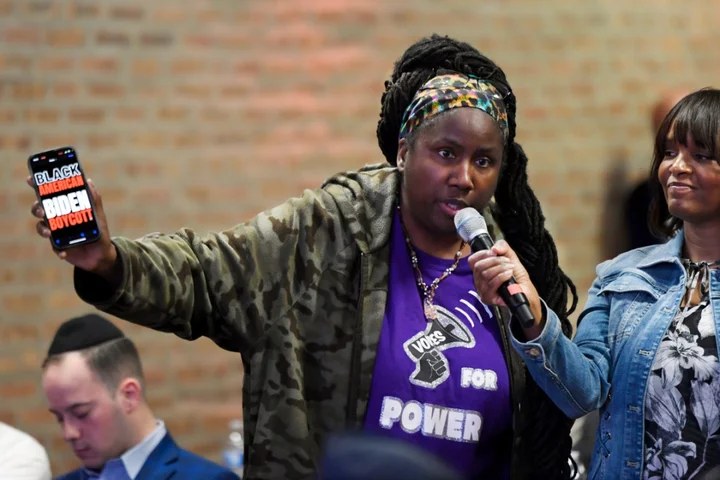
Diverse Republican presidential primary field sees an opening in 2024 with voters of color
During Donald Trump's first visit as president to Chicago, a frequent target in his attacks on urban violence, he disparaged the nation's third largest city as a haven for criminals and a national embarrassment. At a recent town hall, Republican presidential contender Vivek Ramaswamy sat alongside ex-convicts on the city's South Side and promised to defend Trump's “America First” agenda. In return, the little-known White House hopeful, a child of Indian immigrants, found a flicker of acceptance in a room full of Black and brown voters. The audience nodded when Ramaswamy said that “anti-Black racism is on the rise,” even if they took issue with his promise to eliminate affirmative action and fight “woke” policies. “America First applies to all Americans — not just the few that Republicans talk to,” he said. Race has emerged as a central issue — and a delicate one — in the 2024 presidential contest as the GOP's primary field so far features four candidates of color, making it among the most racially diverse ever. South Carolina Sen. Tim Scott, the first Black senator in the South since Reconstruction, entered the contest earlier in the month. He joined Nikki Haley, a former South Carolina governor and U.N. ambassador who is of Indian descent, and Larry Elder, an African American raised in Los Angeles' South Central neighborhood who came to national attention as a candidate in the failed effort two years ago to recall California Gov. Gavin Newsom. Miami Mayor Francis Suarez, who is of Cuban descent, says he may enter the race in the coming days. Most of the candidates of color are considered underdogs in a field currently dominated by Trump and Florida Gov. Ron DeSantis. Yet the party’s increasingly diverse leadership, backed by evolving politics on issues such as immigration, suggest the GOP may have a real opportunity in 2024 to further weaken the Democrats’ grip on African Americans and Latinos. Those groups have been among the most loyal segments of the Democratic coalition since Republican leaders fought against the Civil Rights Act of 1964. The Republican presidential contenders of 2024 walk a fine line when addressing race with the GOP’s overwhelmingly white primary electorate. In most cases, the diverse candidates in the Republican field play down the significance of their racial heritage. They all deny the existence of systemic racism in the United States even while discussing their own personal experience with racial discrimination. They oppose policies around policing, voting rights and education that are specifically designed to benefit disadvantaged communities and combat structural racism. The NAACP recently issued a travel advisory for the state of Florida under DeSantis' leadership, warning of open hostility “toward African Americans, people of color and LGBTQ+ individuals.” The notice calls out new policies enacted by the governor that include blocking public schools from teaching students about systemic racism and defunding programs aimed at diversity, equity and inclusion. The Republican presidential candidates of color largely support DeSantis' positions. Marc Morial, president and CEO of the National Urban League, said the GOP’s policies are far more important than the racial and ethnic diversity of their presidential candidates. He noted there also were four Republican candidates of color in 2016, the year Trump won the White House after exploiting tensions over race and immigration. “White nationalists, insurrectionists and white supremacists seem to find comfort in the (Republican) Party,” Morial said. “I think we’re beyond the politics of just the face of a person of color by itself appealing to people of color. What do you stand for?” With few exceptions, the Republican candidates who have entered the presidential primary field have embraced the GOP's “anti-woke” agenda, which is based on the notion that policies designed to address systemic inequities related to race, gender or sexuality are inherently unfair or even dangerous. DeSantis this past week described such policies as “cultural Marxism.” Still, the GOP's diverse field is not ignoring race. Indeed, some candidates are making their race a central theme in their appeal to Republican primary voters even as they deny that people of color face systemic challenges. Scott insisted that America is not a racist country in his recent announcement speech. “We are not defined by the color of our skin. We are defined by the content of our character. And if anyone tells you anything different, they’re lying,” he said. In her announcement video, Haley noted that she was raised in a small town in South Carolina as “the proud daughter of Indian immigrants — not black, not white, I was different.” Like Scott, she has defended the GOP against charges of racism. “Some think our ideas are not just wrong, but racist and evil," Haley said. "Nothing could be further from the truth." Elder is quick to criticize the Democrats’ “woke” agenda, Black Lives Matter and the notion of systemic racism. Critics say such messages are actually designed to win over suburban white voters more than to attract voters of color. But on the South Side of Chicago on a recent Friday afternoon, there were signs that some Black voters were open to the GOP's new messengers, given their frustration with both political parties. One attendee at Ramaswamy's town hall waved a flyer for a “Biden boycott” because the Democratic president has not signaled whether he supports reparations for the descendants of slaves, although Biden did back a congressional effort to study the issue. None of the GOP's presidential candidates supports reparations, either. Others condemned Democrats, in Chicago and in Washington, for working harder to help immigrants who are in the country illegally than struggling African American citizens. Federal officials were preparing to relocate hundreds of migrants from the U.S.-Mexico border to the South Side, even as many local residents struggled with violence and difficult economic conditions. “It is certainly true that there are multiple shades of melanin in this Republican race,” Ramaswamy said in an interview before the event. “I think that in some ways dispels the myth that much of the left will perpetuate that this is somehow you know, a racist party or whatever drivel.” He added: “But personally, I could care less what someone’s skin color is. I think what matters is, what are they going to accomplish? What’s their vision?” As of now, the GOP does not have any Hispanic candidates in the 2024 contest. But Suarez, the Miami mayor, said he may change that in the coming days. “I think it’s important the field does have candidates that can connect with and motivate Hispanics to continue a trend that's already happening,” he said in an interview, noting that he's “very strongly” considering a White House bid. “Democrats have failed miserably to connect with Hispanics." A majority of Latino voters supported Biden in the 2020 presidential contest, according to AP VoteCast, an extensive national survey of the electorate. But Trump cut into that support in some competitive states, including Florida and Nevada, revealing important shifts among Latinos from many different cultural backgrounds. In last fall's midterm elections, support grew for Republican candidates among Black voters, although they remained overwhelmingly supportive of Democrats, AP Votecast found. Overall, Republican candidates were backed by 14% of Black voters, compared with 8% in the midterm elections four years earlier. While the shifts may be relatively small, strategists in both parties acknowledge that any shift is significant given how close some elections may be in 2024. In Chicago, Tyrone Muhammad, who leads Ex-Cons for Social Change, lashed out at Republicans for being “losers” for not seizing a very real opportunity to win over more African Americans. While sitting next to Ramaswamy on stage, he also declared that the Republican Party is racist. Later, he said he actually voted for Trump in 2020 because Trump enacted a criminal justice bill that aimed to shorten prison sentences for nonviolent drug offenders and address racial inequalities in the justice system. While the GOP has since embraced tough-on-crime rhetoric, Muhammed noted that Biden as a senator helped pass the 1994 crime bill that led to the mass incarceration of Black people. Muhammad said he might vote Republican again in 2024, despite the party's shortcomings. He pointed to the GOP's fight against illegal immigration as a core reason for support. “I may not like you as an individual, but I like your issues, I like your policies," he said. ___ Fields reported from Washington. Associated Press writer Thomas Beaumont in Des Moines, Iowa, contributed to this report. ___ The Associated Press receives support from several private foundations to enhance its explanatory coverage of elections and democracy. See more about AP’s democracy initiative here. The AP is solely responsible for all content. Read More Ukraine war’s heaviest fight rages in east - follow live Charity boss speaks out over ‘traumatic’ encounter with royal aide AP News Digest 8:40 a.m. Asylum-seekers say joy over end of Title 42 turns to anguish induced by new US rules Why Texas Attorney General Ken Paxton's impeachment fight isn't finished yet
2023-05-28 21:18
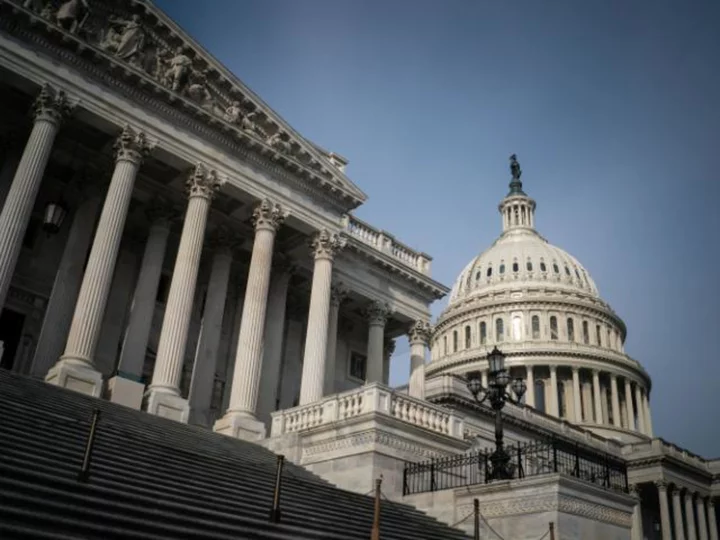
Here's what's in the debt ceiling deal
After several weeks of tense negotiations, President Joe Biden and House Republicans have reached an agreement in principle to raise the debt ceiling and cap spending.
2023-05-28 19:26
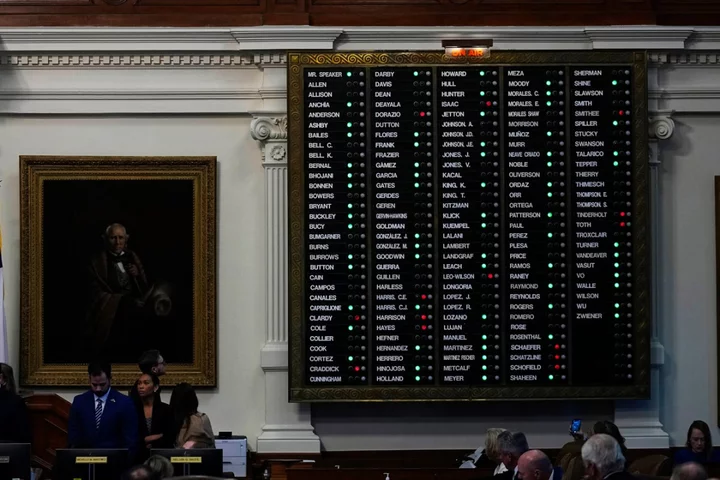
Fight still ahead for Texas' Ken Paxton after historic impeachment deepens GOP divisions
The historic impeachment of Texas Attorney General Ken Paxton plunged Republicans on Sunday into a fight over whether to banish one of their own in America's biggest red state after years of scandal and criminal accusations that will now be at the center of a trial in the state Senate. Paxton said he has “full confidence” as he awaits judgement from the Senate, where his conservative allies include his wife, state Sen. Angela Paxton, who has not said whether she will recuse herself from the proceedings to determine whether her husband will be permanently removed from office. For now, Texas' three-term attorney general is immediately suspended after the state House of Representatives on Saturday impeached Paxton on 20 articles that included bribery and abuse of public trust. The decisive 121-23 vote amounted to a clear rebuke from the GOP-controlled chamber after nearly a decade of Republican lawmakers taking a mostly muted stance on Paxton's alleged misdeeds, which include felony securities fraud charges from 2015 and an ongoing FBI investigation into corruption accusations. He is just the third sitting official in Texas' nearly 200-year history to have been impeached. "No one person should be above the law, least not the top law officer of the state of Texas,” said Republican state Rep. David Spiller, who was part of a House investigative committee that this week revealed it had quietly been looking into Paxton for months. Republican Texas Gov. Greg Abbott has remained silent about Paxton all week , including after Saturday's impeachment. Abbott, who was the state's attorney general prior to Paxton's taking the job in 2015, has the power to appoint a temporary replacement pending the outcome in the Senate trial. It is not year clear when the Senate trial will take place. Final removal of Paxton would require a two-thirds vote in the Senate, where Republican members are generally aligned with the party's hard right. The Senate is led by Lt. Gov. Dan Patrick, who has served as state chairman for former President Donald Trump's campaigns in Texas. Before the vote Saturday, Trump and U.S. Sen. Ted Cruz came to Paxton’s defense, with the senator calling the impeachment process “a travesty” and saying the attorney general’s legal troubles should be left to the courts. “Free Ken Paxton,” Trump wrote on his social media platform Truth Social, warning that if House Republicans proceeded with the impeachment, “I will fight you.” Paxton, 60, decried the outcome in the House moments after scores of his fellow partisans voted for impeachment. His office pointed to internal reports that found no wrongdoing. “The ugly spectacle in the Texas House today confirmed the outrageous impeachment plot against me was never meant to be fair or just,” Paxton said. "It was a politically motivated sham from the beginning.” Lawmakers allied with Paxton tried to discredit the investigation by noting that hired investigators, not panel members, interviewed witnesses. They also said several of the investigators had voted in Democratic primaries, tainting the impeachment, and that Republican legislators had too little time to review evidence. “I perceive it could be political weaponization,” Rep. Tony Tinderholt, one of the House’s most conservative members, said before the vote. Republican Rep. John Smithee compared the proceeding to "a Saturday mob out for an afternoon lynching.” Rice University political science professor Mark P. Jones said the swift move to impeach kept Paxton from rallying significant support and allowed quietly frustrated Republicans to come together. “If you ask most Republicans privately, they feel Paxton is an embarrassment. But most were too afraid of the base to oppose him,” Jones said. By voting as a large bloc, he added, the lawmakers gained political cover. To Paxton’s longstanding detractors, however, the rebuke was years overdue. In 2014, he admitted to violating Texas securities law, and a year later was indicted on securities fraud charges in his hometown near Dallas, accused of defrauding investors in a tech startup. He pleaded not guilty to two felony counts carrying a potential sentence of five to 99 years. He opened a legal defense fund and accepted $100,000 from an executive whose company was under investigation by Paxton’s office for Medicaid fraud. An additional $50,000 was donated by an Arizona retiree whose son Paxton later hired to a high-ranking job but soon was fired after displaying child pornography in a meeting. In 2020, Paxton intervened in a Colorado mountain community where a Texas donor and college classmate faced removal from his lakeside home under coronavirus orders. But what ultimately unleased the impeachment push was Paxton's relationship with Austin real estate developer Nate Paul. In 2020, eight top aides told the FBI they were concerned Paxton was misusing his office to help Paul over the developer's unproven claims about an elaborate conspiracy to steal $200 million of his properties. The FBI searched Paul’s home in 2019, but he has not been charged and denies wrongdoing. Paxton also told staff members he had an affair with a woman who, it later emerged, worked for Paul. The impeachment accuses Paxton of attempting to interfere in foreclosure lawsuits and issuing legal opinions to benefit Paul. The bribery charges included in the impeachment allege Paul employed the woman with whom Paxton had an affair in exchange for legal help and that he paid for expensive renovations to the attorney general's home. A senior lawyer for Paxton’s office, Chris Hilton, said Friday that the attorney general paid for all repairs and renovations. Other charges, including lying to investigators, date back to Paxton’s still-pending securities fraud indictment. Four aides who reported Paxton to the FBI later sued under Texas’ whistleblower law, and in February he agreed to settle the case for $3.3 million. The House committee said the probe was sparked by Paxton seeking legislative approval for the payout. “But for Paxton’s own request for a taxpayer-funded settlement over his wrongful conduct, Paxton would not be facing impeachment,” the panel said. ___ Bleiberg reported from Dallas. Read More Ukraine war’s heaviest fight rages in east - follow live Charity boss speaks out over ‘traumatic’ encounter with royal aide Texas GOP Attorney General Ken Paxton impeached by Republican-controlled Statehouse AP News Digest 3 a.m. Texas' GOP-held House set for impeachment proceedings against Attorney General Ken Paxton
2023-05-28 12:20
